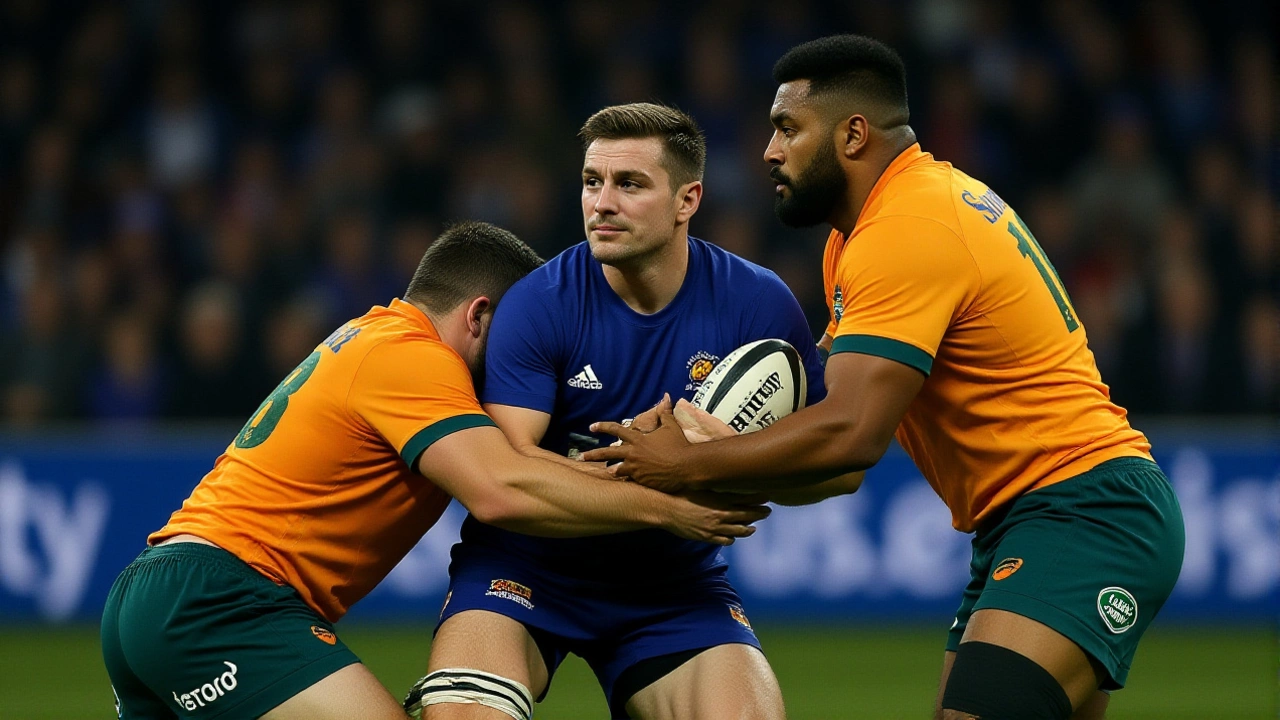It was a rollercoaster first quarter at Stade de France — five points, two tries, a penalty advantage, and a lead swapped twice before the 25th minute. The Wallabies clawed back from a early deficit to take a 12-7 lead over France in their 2025 International Rugby match on Saturday, November 22, 2025, at 9:10 p.m. local time in Paris. But for all the flashes of brilliance, the result felt less like a statement and more like a sigh of relief.
Early chaos sets the tone
At 7 minutes, the Wallabies were up 5-0 after a penalty from fly-half Quade Cooper. It was the kind of start Australia’s fans had been waiting for — disciplined, aggressive, and clinical. But then, France responded like a coiled spring snapping. At 10 minutes, Nicolas Depoortere broke through a tired defensive line with a 60-meter counterattack, finishing under the posts. The conversion was perfect. France led 7-5. For the first time since July 2021, they held the advantage over Australia on home soil.
It wasn’t just the scoreline that shifted. The rhythm changed. France’s pack, heavier and more relentless than Australia’s, began to dominate the scrum. The Wallabies, missing key forwards from their Ireland loss, looked unsettled. But then came the twist: a French offside near their own 22. Instead of kicking for touch, Cooper — at 36, still playing with the instincts of a man half his age — went quick. The ball found Angus Bell, the NSW Waratahs prop, who surged through a gap like a freight train with no brakes. He crashed over. Conversion good. Australia 12, France 7.
Cooper’s magic and Schmidt’s gamble
Quade Cooper’s decision to attack instead of kick was the kind of instinctive brilliance that makes rugby beautiful. But it wasn’t luck. It was experience. After years of playing under pressure, Cooper knew France’s defense was still adjusting — especially after their own attack had just burned out. That’s why he didn’t wait. That’s why he saw the space before it even opened.
Coach Joe Schmidt had rolled the dice by bringing back Taniela Tupou and Dylan Pietsch after their absence against Ireland. Tupou, the 28-year-old prop from the Queensland Reds, brought raw power. Pietsch, 25, from the Western Force, offered mobility and tackle-breaking ability. Their return was meant to shore up Australia’s fractured forward pack — and for the first 25 minutes, it worked. But the rest of the team? Still searching.
“We’ve had good performances this year,” said ESPN’s November 22 report. “But this month? More questions than answers.” Losses to England, Italy, and Ireland. A narrow win over Japan. Now, against a France side that had won their last four meetings, Australia was clinging to a five-point lead after a quarter that felt more like a war of attrition than a rugby match.
France’s structure vs. Australia’s chaos
France didn’t need flashy plays to hurt you. They just needed to keep coming. Their forwards hit rucks like jackhammers. Their half-backs moved the ball with surgical precision. Their defense? Tight. Unyielding. As Two Cents Rugby noted in their live commentary, “France are a machine. Australia are a heartbeat away from collapse.”
And that’s the problem. The Wallabies have the talent — Cooper, Tupou, Bell — but they lack cohesion. They’re a collection of individuals trying to play a team game. France, by contrast, operate like a single organism. Every player knows their role. Every movement is rehearsed. And when the pressure mounts — as it did in Paris — they don’t break. They tighten.
The officiating crew — Mike Adamson (SRU) as FPRO and Marius van der Westhuizen (SARU) as TMO — kept a tight rein. No controversial decisions. No soft penalties. Just clean, consistent calls. That meant Australia couldn’t rely on referee leniency to bail them out. They had to earn it. And they did — barely.

What this means for 2026
This match was Australia’s final outing of their 2025 Spring Tour. A win here wouldn’t erase the losses to England and Ireland, but it would offer momentum. A loss? It would be another nail in the coffin of a season already buried under criticism.
For Schmidt, it was about proving his system works. For the players, it was about pride. For fans? It was about hope. And while the 12-7 lead offered a glimmer, the bigger picture remains grim. Australia’s world ranking has slipped to 9th — their lowest since 2018. The 2026 Rugby Championship looms. New Zealand and South Africa are reloading. Argentina is rising. And France? They’re just getting started.
“They’re not broken,” said former Wallaby captain George Gregan on post-match analysis. “They’re just not built yet. This team needs time. And structure. And maybe, just maybe, a new coach after this cycle.”
How the world watched
In Australia, over 1.2 million viewers tuned into Stan Sport at 7:10 a.m. AEDT. In the UK, TNT Sports and Discovery+ carried the match live. Social media exploded — not with celebration, but with concern. #WallabiesStillLost trended in Sydney. #FranceStillDominant trended in Paris. The disconnect between performance and expectation is widening.
The match ended 12-7 in Australia’s favor after a tense, attritional second half. But the real story wasn’t the score. It was the silence that followed. No cheers. No chants. Just the echo of what could have been — and what might still be lost.
Frequently Asked Questions
Why did Australia struggle despite bringing back Tupou and Pietsch?
While Taniela Tupou and Dylan Pietsch added physicality and mobility, the Wallabies’ backline and midfield lacked cohesion. Quade Cooper was brilliant, but the supporting cast — particularly the centers and second row — failed to create consistent attacking platforms. France’s defensive structure neutralized Australia’s individual brilliance, exposing the lack of depth in key positions.
How does this result affect Australia’s 2026 Rugby Championship chances?
The narrow win keeps Australia’s ranking just above 9th, but it doesn’t reverse the trend. With New Zealand and South Africa both strengthening their squads, Australia’s chances of challenging for the title are slim unless they fix their defensive discipline and build continuity between forwards and backs. A loss in the next Test could drop them to 10th — their lowest in 25 years.
What’s the historical context between Australia and France in recent years?
Since Australia’s last win in July 2021 (23-21 in Paris), France have won six of the last seven meetings, including a 2-1 series victory in France in 2023. France have consistently outperformed Australia in physicality, set-piece execution, and tactical discipline — especially on home soil. The Wallabies’ last away win over France was in 2018.
Why was Quade Cooper’s decision to go quick so crucial?
After France’s try, Australia was under pressure. Kicking for touch would’ve given France time to reset their defense. Instead, Cooper’s quick penalty tap — combined with Bell’s timing — caught France off-guard. It was a high-risk, high-reward move that only a veteran like Cooper, with 100+ Test caps, would attempt. It shifted momentum and gave Australia the psychological edge they desperately needed.
Who were the key officials in the match, and why does their role matter?
Referee Mike Adamson (SRU) and TMO Marius van der Westhuizen (SARU) ensured a clean, fair contest. With both teams playing physically, their consistent interpretation of the laws prevented the match from descending into chaos. Van der Westhuizen’s TMO calls — including confirming Bell’s try and disallowing a French try for a forward pass — were pivotal. No controversial decisions meant the result was decided on the field, not by officials.
What’s next for the Wallabies after this match?
The Wallabies return to Australia for a six-week training block before the 2026 Rugby Championship. Coach Joe Schmidt’s future is under scrutiny, with speculation mounting about potential replacements. Key players like Cooper and Tupou may not be available for all Tests next year due to injuries or club commitments. The team needs urgent structural reform — not just tactical tweaks — to avoid further decline.
